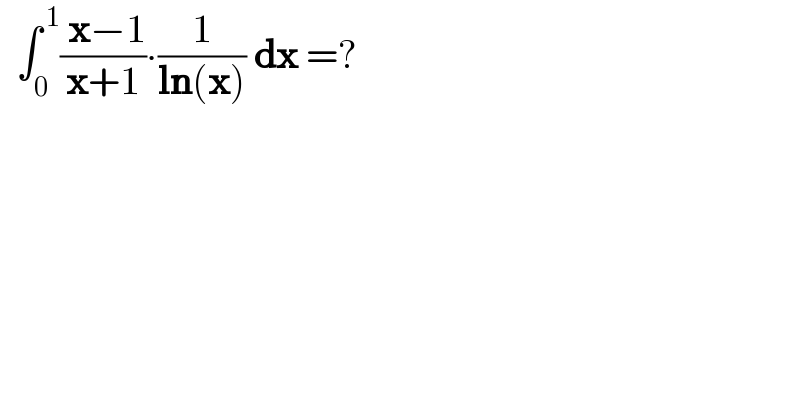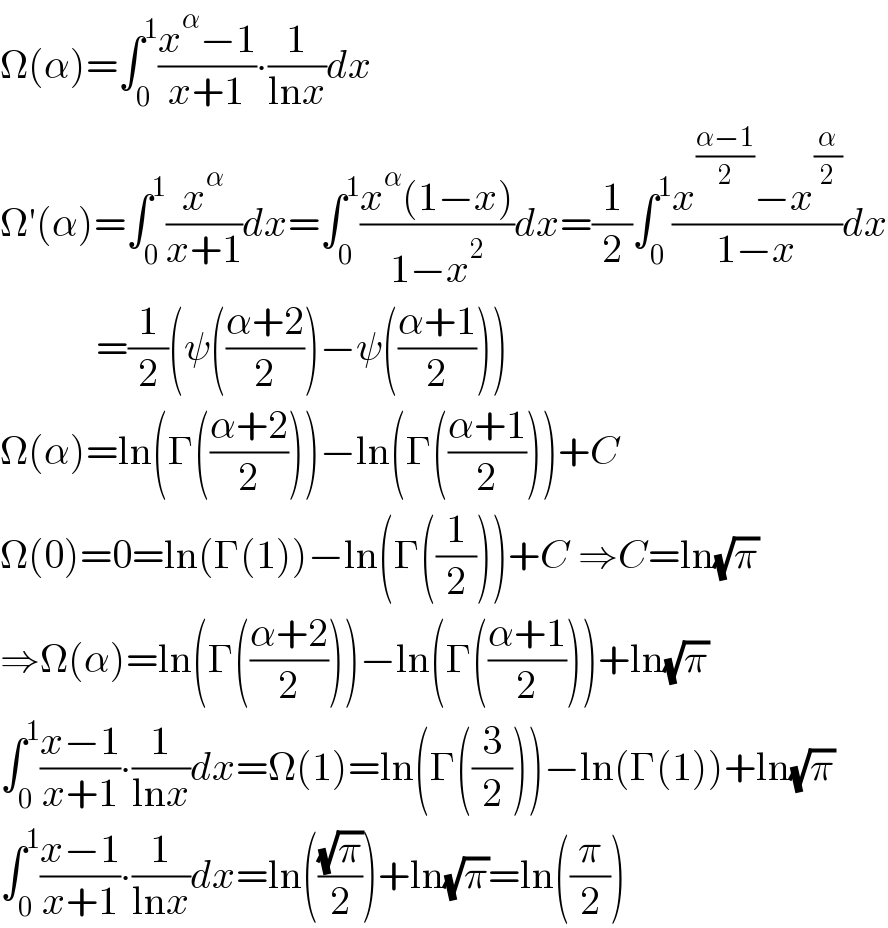Question Number 184029 by SEKRET last updated on 02/Jan/23

$$\:\:\int_{\mathrm{0}} ^{\:\mathrm{1}} \frac{\:\boldsymbol{\mathrm{x}}−\mathrm{1}}{\boldsymbol{\mathrm{x}}+\mathrm{1}}\centerdot\frac{\mathrm{1}}{\boldsymbol{\mathrm{ln}}\left(\boldsymbol{\mathrm{x}}\right)}\:\boldsymbol{\mathrm{dx}}\:=? \\ $$
Answered by ARUNG_Brandon_MBU last updated on 02/Jan/23

$$\Omega\left(\alpha\right)=\int_{\mathrm{0}} ^{\mathrm{1}} \frac{{x}^{\alpha} −\mathrm{1}}{{x}+\mathrm{1}}\centerdot\frac{\mathrm{1}}{\mathrm{ln}{x}}{dx} \\ $$$$\Omega'\left(\alpha\right)=\int_{\mathrm{0}} ^{\mathrm{1}} \frac{{x}^{\alpha} }{{x}+\mathrm{1}}{dx}=\int_{\mathrm{0}} ^{\mathrm{1}} \frac{{x}^{\alpha} \left(\mathrm{1}−{x}\right)}{\mathrm{1}−{x}^{\mathrm{2}} }{dx}=\frac{\mathrm{1}}{\mathrm{2}}\int_{\mathrm{0}} ^{\mathrm{1}} \frac{{x}^{\frac{\alpha−\mathrm{1}}{\mathrm{2}}} −{x}^{\frac{\alpha}{\mathrm{2}}} }{\mathrm{1}−{x}}{dx} \\ $$$$\:\:\:\:\:\:\:\:\:\:\:\:=\frac{\mathrm{1}}{\mathrm{2}}\left(\psi\left(\frac{\alpha+\mathrm{2}}{\mathrm{2}}\right)−\psi\left(\frac{\alpha+\mathrm{1}}{\mathrm{2}}\right)\right) \\ $$$$\Omega\left(\alpha\right)=\mathrm{ln}\left(\Gamma\left(\frac{\alpha+\mathrm{2}}{\mathrm{2}}\right)\right)−\mathrm{ln}\left(\Gamma\left(\frac{\alpha+\mathrm{1}}{\mathrm{2}}\right)\right)+{C} \\ $$$$\Omega\left(\mathrm{0}\right)=\mathrm{0}=\mathrm{ln}\left(\Gamma\left(\mathrm{1}\right)\right)−\mathrm{ln}\left(\Gamma\left(\frac{\mathrm{1}}{\mathrm{2}}\right)\right)+{C}\:\Rightarrow{C}=\mathrm{ln}\sqrt{\pi} \\ $$$$\Rightarrow\Omega\left(\alpha\right)=\mathrm{ln}\left(\Gamma\left(\frac{\alpha+\mathrm{2}}{\mathrm{2}}\right)\right)−\mathrm{ln}\left(\Gamma\left(\frac{\alpha+\mathrm{1}}{\mathrm{2}}\right)\right)+\mathrm{ln}\sqrt{\pi} \\ $$$$\int_{\mathrm{0}} ^{\mathrm{1}} \frac{{x}−\mathrm{1}}{{x}+\mathrm{1}}\centerdot\frac{\mathrm{1}}{\mathrm{ln}{x}}{dx}=\Omega\left(\mathrm{1}\right)=\mathrm{ln}\left(\Gamma\left(\frac{\mathrm{3}}{\mathrm{2}}\right)\right)−\mathrm{ln}\left(\Gamma\left(\mathrm{1}\right)\right)+\mathrm{ln}\sqrt{\pi} \\ $$$$\int_{\mathrm{0}} ^{\mathrm{1}} \frac{{x}−\mathrm{1}}{{x}+\mathrm{1}}\centerdot\frac{\mathrm{1}}{\mathrm{ln}{x}}{dx}=\mathrm{ln}\left(\frac{\sqrt{\pi}}{\mathrm{2}}\right)+\mathrm{ln}\sqrt{\pi}=\mathrm{ln}\left(\frac{\pi}{\mathrm{2}}\right) \\ $$
Commented by SEKRET last updated on 02/Jan/23

$$\:\:\boldsymbol{\mathrm{good}}\:\:\boldsymbol{\mathrm{thank}}\:\:\boldsymbol{\mathrm{you}}\:\:\boldsymbol{\mathrm{sir}} \\ $$
Commented by ARUNG_Brandon_MBU last updated on 02/Jan/23
����
